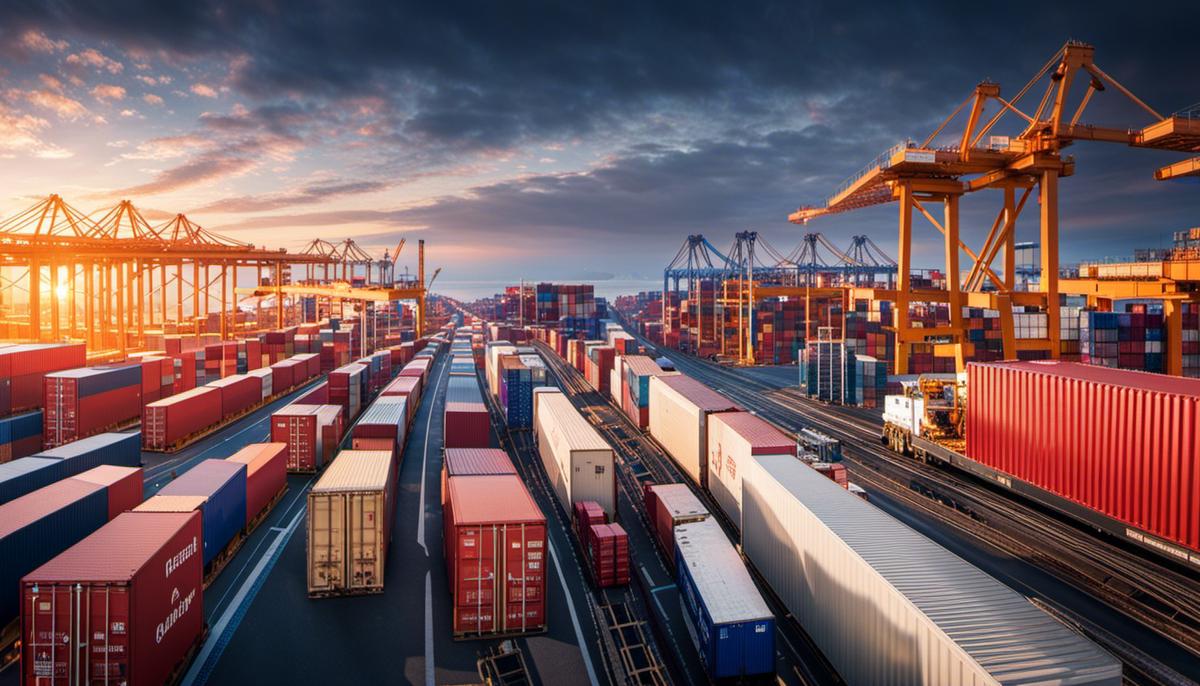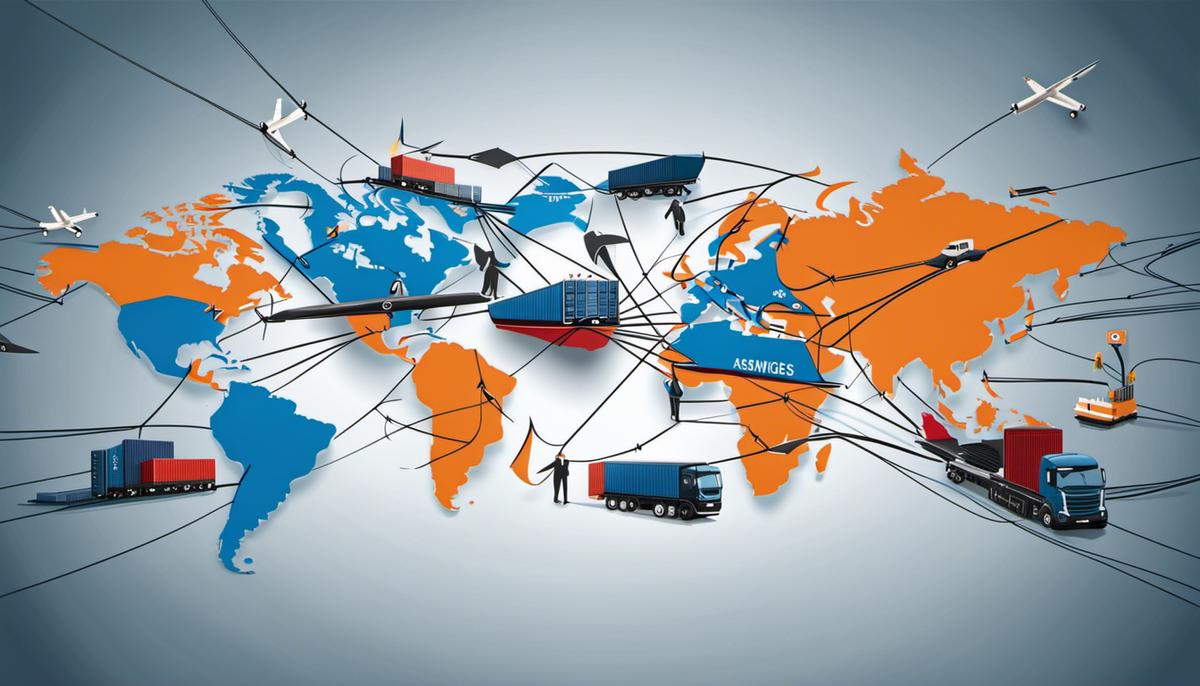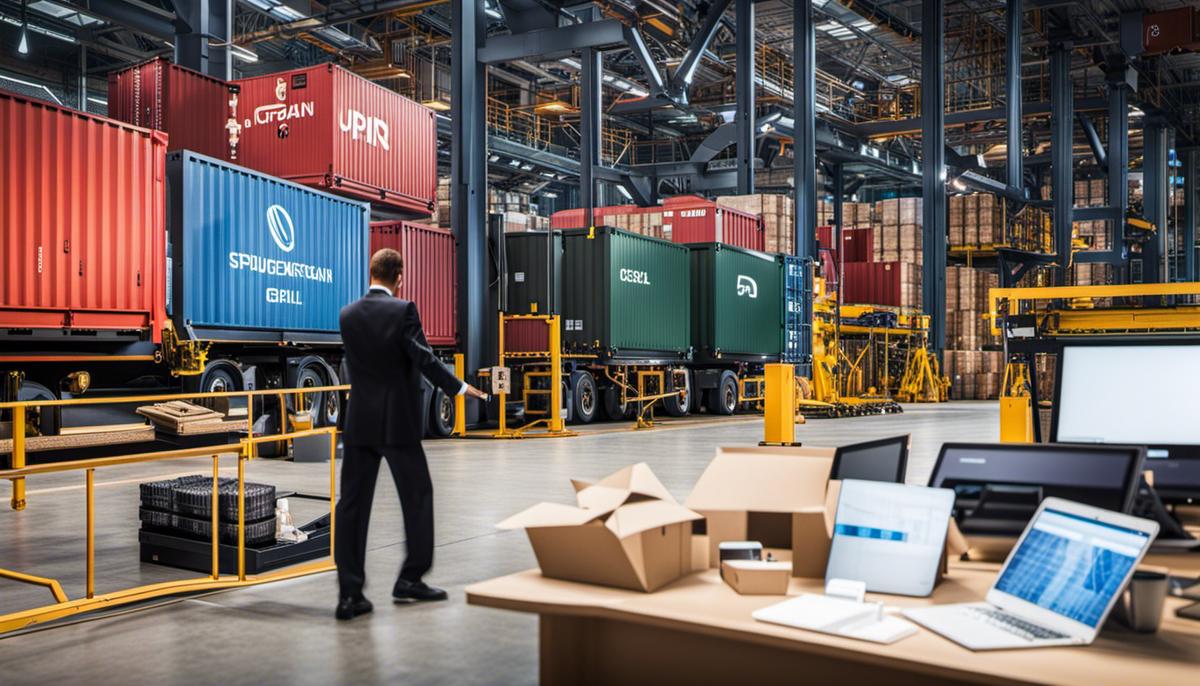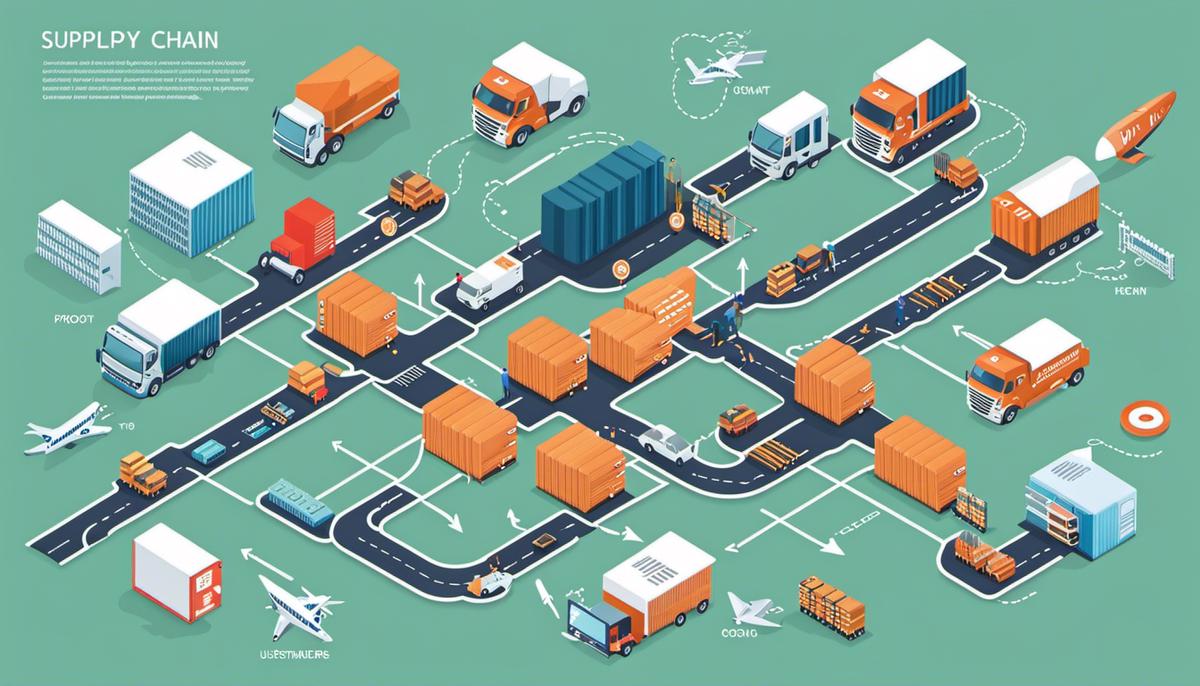In the dynamic world of business, a proficient understanding of global supply chain management serves as a linchpin for organizations seeking to leverage their operations in an increasingly interconnected global economy. With a focus on the principles, challenges, technology innovations, sustainability concerns, and predictions for the future, this comprehensive examination of global supply chain management offers a broad view of its irreplaceable role in global commerce. Indeed, to comprehend the intricacies of global supply chain management is to decipher the pulse of modern day business – from the procurement of raw materials to the delivery of finished goods to the consumer.
Understanding the Basics of Supply Chain Management
Understanding Supply Chain Management
Supply Chain Management (SCM) is a model that optimizes business processes to deliver products and services from vendor to customer in the most efficient and effective manner. It involves the coordination and integration of all activities involved in sourcing, conversion, and logistics management. Ultimately, the goal of SCM is to reduce inventory, increase transaction speed, streamline processes, and create more satisfactory customer experiences.
Key Terminology in Supply Chain Management
There are several key concepts and terms that serve as pillars in the understanding of SCM. The ‘supply chain’ refers to the series of steps or stages involved in the production and distribution of a product or service, from raw material sourcing to end consumer. ‘Logistics’ is the process of planning, implementing, and controlling the efficient flow and storage of goods, services, and related information. ‘Inventory management’ involves the monitoring and control of stock levels to fulfill demand promptly. ‘Lead time’ refers to the amount of time between the initiation and completion of a production process.
The Basics of How Supply Chains Work
Supply chains begin with the sourcing of raw materials or services, which are then converted into finished products. These finished products are stored until demand arises, at which point they are delivered to customers. This process is carried out through a precise coordination of various supply chain processes including procurement, production, storage, transportation, and customer service. It should be noted that information about demand, product status, and other pertinent details is continually shared up and down the chain to enable smooth operation.
The Importance of Supply Chains in Global Commerce
Supply chains are crucial to global trade because they connect producers and consumers in different nations and markets. They facilitate the flow of goods, services, and capital across borders, fueling economic interdependence and global integration. Supply chains also enable businesses to leverage comparative advantages, reduce production costs, and increase product diversity.
The Roles of Different Actors in the Supply Chain
Numerous entities play essential roles in the supply chain, each with distinct responsibilities. Suppliers provide the raw materials necessary for production. Manufacturers convert these raw materials into finished products. Distributors and transportation firms handle the storage and movement of these products. Retailers sell the products to consumers, and finally, consumers use the products.
Differences between Simple and Global Supply Chains
A simple supply chain typically involves fewer stages, entities, and geographical locations. It might encompass a local or national level, usually comprising a straightforward manufacturer-distributor-retailer-customer sequence. On the other hand, a global supply chain has more layers of complexity. It involves multiple countries, various legal and trade regulations, and interconnected supply networks. This level of complexity often leads to potential challenges like longer lead times, cultural differences, geopolitical factors, and more complicated logistics.
Globalization’s Impact on Global Supply Chain Management
Globalization significantly influences global Supply Chain Management (SCM), expanding markets, intensifying competition, and diversifying consumer bases. It’s also prompted the uptake of innovative technologies, adherence to global standards, and adjustments in risk management approaches. Further, globalization accentuates the importance of supply chain visibility, sustainability, and resilience. Although handling international supply chains is complex, a well-structured and effectively managed global supply chain presents unmatched opportunities for businesses to flourish in the worldwide market.

Challenges and Risks in Global Supply Chain Management
The Intricacies of Global Supply Chain Management
Managing a global supply chain presents several challenges, starting with the logistical difficulties of coordinating multiple global distributors, suppliers, and manufacturers. These can lead to various problems, such as transport delays, warehouse capacity issues, and inefficient tracking systems, which disrupt the smooth delivery of goods and services. This disruption hinders global supply chain management’s efficiency and effectiveness.
Moreover, geopolitical factors can affect global supply chains. Trade operations and policies are often directly impacted by political instability, conflicts, or changes within a country’s government. For instance, tariffs and trade wars may restrict the availability of necessary materials or increase product costs, leading to potential supply chain disruptions.
Equally notable are the challenges presented by cultural differences in managing global supply chains. Variances in business practices, traditions, language, and legal systems may lead to misunderstandings or conflicts. Comprehensive understanding, learning, and adaptation are therefore essential to prevent inefficiencies or errors in the global supply chain process.
Strategies for Risk Management in Global Supply Chain
The landscape of global supply chain management is profoundly affected by changes in trade policies, which can be driven by political shifts or economic fluctuations. Adjustments in tariffs, import or export limitations, and financial regulations can significantly alter the costs and procedures for manufacturing and distributing goods. This dynamic environment necessitates organizations to be adaptable, adjusting strategies in response to policy changes.
The challenges posed by global crises like pandemics make this flexibility even more critical. For instance, COVID-19 significantly altered global supply chain dynamics, leading to labor shortages, transportation disruptions, and imbalances in supply and demand. The unpredictable and far-reaching impacts of such crises require the employment of robust risk management strategies.
Strategies for managing these risks often involve diversifying suppliers to mitigate dependency risks, implementing advanced tracking and reporting systems for efficient logistics management, and developing contingency plans for potential disruptions. Furthermore, organizations are also beginning to realize the importance of cultural competency training to facilitate fruitful interactions with international partners.
Besides, to navigate the complex global trade environment successfully, staying updated with geopolitical developments and corresponding strategic adjustments is essential. A regular analysis of global crises and their impacts on supply chains aids in disaster recovery planning. Such strategies form an essential part of risk management within global supply chain management.

Innovation and Technology in Global Supply Chain Management
The Role of Innovation and Technology in Global Supply Chain Management
Alongside effective risk management, technological innovation is also revolutionizing global supply chain management. Rapid advancements in technologies like Artificial Intelligence (AI), blockchain, the Internet of Things (IoT), and big data analytics have resulted in remarkable changes to the efficiency, transparency, and resilience of global supply chains. By integrating such innovative technology, organizations can unlock significant potential and enhance their supply chain’s robustness amid uncertain economic landscapes.
Impact of AI on Global Supply Chain Management
AI, for example, is increasingly being utilized across all areas of the supply chain. Manufacturing processes employ AI algorithms to speed up production, maximize efficiency, and cut down on potential errors. This technology is also used to predict demand, streamline inventory, and reduce lead time. Furthermore, AI has facilitated the development and implementation of autonomous vehicles and drones in the logistics sector, significantly enhancing the delivery process.
Blockchain Technology in Supply Chain Management
Blockchain technology is another significant innovation in supply chain management. Known for its transparency and security, blockchain technology is used to track goods throughout their lifecycle, providing transparency to all parties involved. This ensures the integrity of data, prevents fraud, and builds trust among stakeholders. Additionally, smart contracts, a blockchain-based application, enable automatic execution of agreements when predetermined conditions are met, dramatically reducing paperwork and simplifying transactions.
Internet of Things in Supply Chain Management
The Internet of Things (IoT) plays a crucial role in global supply chain management as well. IoT devices can monitor and record real-time data, making it easier to track products and components throughout the supply chain. This technology can also help companies to detect bottlenecks, errors, and inefficiencies in real-time, enabling prompt corrective actions. Leveraging IoT can significantly enhance the transparency and visibility of logistics, reducing costs and risks associated with lost, stolen, or delayed shipments.
Big Data Analytics in Supply Chain Management
Big Data Analytics is another key technological advancement that is reshaping supply chain management. It allows companies to collect, process, and analyze large volumes of data to uncover patterns, correlations, and trends that might not have been apparent otherwise. This provides insights into customer behavior, market trends, and supply chain performance, leading to better decisions, demand forecasting, and risk management.
Concluding Remarks
Indeed, it is apparent that breakthroughs in Artificial Intelligence (AI), blockchain, the Internet of Things (IoT), and extensive data analysis are significantly influencing the paradigm of global supply chain management. These advancements hold the promise of enhancing productivity, fostering transparency, and strengthening the robustness of supply chains across the globe. Furthermore, as technology persistently progresses, additional transformations and opportunities will likely emerge for those businesses inclined to innovate and adjust to the changes.

Sustainability and Ethics in Global Supply Chain Management
Delving into the Realm of Global Supply Chain Management
Global Supply Chain Management, or GSCM, encapsulates the methodology employed by corporations to synchronize their network of suppliers, distributors, and consumers scattered around the globe. This assimilation is carried out via activities including the procurement of raw materials, their conversion into finished goods, and subsequently, the distribution of these products to customers. Such systematic tactics substantially impact a company’s overall profit margins, operational efficiency, and position of competitive dominance.
Sustainability in Global Supply Chain Management
Sustainability involves establishing environmentally friendly practices to reduce harm to the environment. This harm often arises from activities such as sourcing, manufacturing, and the transportation of goods in international supply chains. Implementing sustainable practices in a company’s supply chain can include carbon management, waste reduction, energy efficiency, sourcing from environmentally responsible suppliers, and more.
Take Unilever, for instance. This multinational household products company has committed to sourcing 100% of its raw agricultural materials sustainably by 2023. As of now, the company has achieved 62% of its target. Unilever is an example of best practice in sustainable global supply chain management.
Ethics in Global Supply Chain Management
Ethical issues emerge in supply chains due to factors such as labor rights abuses, human rights violations, corruption, and environmental degradation. In response to these challenges, there is an increasing emphasis on incorporating ethics into global supply chain management. This involves ensuring fair treatment of workers, compliance with labor rights and trade laws, promoting fair trade practices, stamping out corruption, and more.
Consider Nike, which overhauled its supply chain following widespread criticism for poor labor conditions at its overseas factories. The company pioneered transparency in the industry by publicly releasing a list of its factories, invested in rigorous factory audits, and adopted sustainability standards for its suppliers.
The Intersection of Sustainability and Ethics in GSCM
When sustainability and ethics are combined in global supply chain management, the result is sustainable and ethical supply chains. This approach takes into account the environmental impact of business operations and the rights and welfare of all stakeholders in the supply chain, from workers at supplier factories to end-consumers. Companies adopting this approach align their supply chain with the principles of corporate social responsibility (CSR) to create positive social and environmental impacts.
Role of Corporate Social Responsibility in Supply Chain Management
Corporate Social Responsibility (CSR) is a self-regulating business model that holds companies accountable for their impact on all aspects of society, including economic, social, and environmental. Through CSR, many companies have re-evaluated their supply chain practices, paying close attention to environmental conservation and ethical labor practices, among others.
Cases in point include Ikea and Starbucks. Ikea has been implementing sustainable practices in its supply chain by focusing on recyclable goods and renewable energy. It aims to source wood from more sustainable sources by 2020 and has already accomplished 77% of its target.
Starbucks, on the other hand, has focused on ethical sourcing. It works with farmers to ensure fair trade for coffee beans and even offers financial support to them in times of crisis. The coffee chain has also set strict supplier expectations, prioritizing suppliers who also prioritize workers’ rights.
Wrapping Up
Remarkably, the significance of sustainability and ethics in global supply chain management has grown exponentially for businesses in the 21st century. Incorporating these facets is vital for a company’s prosperity and efficiency. Moreover, they are primary factors that drive socially responsible and environmentally friendly practices in business.

The Future of Global Supply Chain Management
Future Predictions for Global Supply Chain Management’s Uncertainties
Experts in supply chain sectors are largely agreeing that future challenges, such as extreme weather conditions due to climate change and rising cyberattacks, will redefine the scope of global supply chain management. Increased risks from climate change due to severe weather conditions threaten to disrupt manufacturing processes and distribution channels. Concurrently, cybersecurity threats are looming large, posing significant risks as businesses continue to be more digitally interconnected. To address these imminent threats, it is crucial for managers to build resilient supply chain systems, focusing on diversified sourcing and implementing comprehensive cybersecurity measures.
Growth and Innovation Areas in Supply Chain Management
Artificial intelligence (AI), Machine Learning (ML), and Internet of Things (IoT) technologies offer exciting opportunities for global supply chain management. Predictive analytics can provide companies with real-time visibility of their supply chain operations, enabling timely decision making. Future supply chains will also likely become more sustainable as companies transition towards renewable energy sources and implement practices that minimize waste.
Emerging Markets and Global Supply Chain Management
Emerging markets such as Africa, Asia, and Latin America will have a greater role in global supply chains of the future. They will become important bases for manufacturing and distribution due to elements like lower labor costs and increasing consumer markets. This trend will test the agility of supply chains and their ability to navigate political, economic, and cultural differences.
Changes in Trade Policies and Regulations affecting Supply Chains
Trade policies and regulations have a direct impact on global supply chain management. A trend towards deglobalization and protectionism poses a threat to current supply chain models, potentially requiring a major redesign of global supply chains. Likewise, stricter regulations on emissions and waste management can lead to shifts towards greener supply chains. The Brexit event, recent U.S.-China trade tensions, and the evolving governmental regulations during the Covid-19 pandemic are prime examples of policy changes affecting supply chains worldwide.
The Role of Big Data and Analytics in Future Supply Chains
Big data and advanced analytics have revolutionized the way global supply chains operate, and these are expected to play an even larger role in the future. Supply chain managers can use these technologies to predict customer demand, identify bottlenecks in their operations, and respond quickly to disruptive events. In the future, the use of blockchain technology might also be widespread, improving transparency and traceability in supply chains.
Increased Focus on Supply Chain Resiliency
The Covid-19 pandemic highlighted the vulnerabilities of many supply chains, leading to an increased focus on resiliency. The future will likely see a shift away from lean, single-source supply chains towards models that prioritize redundancy and flexibility. Building resilient supply chains may involve diversifying suppliers, developing local sourcing options, increasing inventory levels, and investing in technologies that improve supply chain visibility.

As the contours of the global economic landscape continue to transform, so will the face of supply chain management. In a dance of evolution propelled by technology, sustainability considerations, and varying geopolitical dynamics, effective global supply chain management will rematerialize according to new paradigms and exigencies. The changes we observe today are but steppingstones towards a future where supply chains are not simply integral to business operations, but a manifestation of a firm’s adaptability, resilience, and commitment to responsible business. It is not just a prediction, but an invitation, to learn, to grow, and to endeavor to shape supply chains of the future, capable of navigating the waves of constant change.

